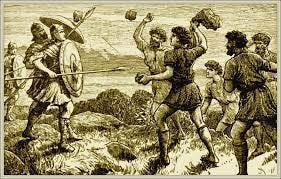If you are looking for the beginning of the study for The Young Carthaginian then you can go HERE for a brief introduction. At the bottom of the introduction you will find the links to each section of the study guide as it becomes available. If you would like to see the growing list of book studies available for free on this site you can go HERE. Enjoy!
Grammar Questions: (The Information of the Text)
What did the people of Catalonia do “at the first alarm” of the Carthaginian invasion?
What did the “conquest cost Hannibal”?
What reasons did Nessus give for shooting the man with an arrow whom Malchus was about to fight?
What factors saved Malchus from any real harm from the bear attack?
What situation forced Malchus and Nessus to confront the other bears in the cave though they har preferred not to?
What are at least three ways in which the deceased she-bear ended up being useful to Malchus and Nessus?
What plan did Malchus come up with to escape their enemies which led Nessus to express “admiration of his leader’s idea”?
As Malchus and Nessus were escaping from their enemies, after having spent a long time in the cave, what realerted their enemies to the fact that they were escaping?
What won Malchus “an even higher place than before in the admiration of his followers”?
Logic Questions: (Interpreting, Comparing/Contrasting, Reasoning)
Why might it be, concerning the people of Catalonia, that “two thousand years changed them but little.” Is there anything to suggest why their way of life and demeanor had stayed so constant over time?
Why might Nessus have become so “greatly attached to his young leader”?
Why was Malchus so confident that there was “no chance” of their being discovered once the enemy had “taken the rope with them”?
Rhetoric Questions: (The Analysis of Ideas in the Text)
Write about a time in your own life where you felt trapped. What was it that made you feel that way? Maybe it was a dangerous situation or perhaps you were just stuck doing something you didn’t want to do. Explain how it made you feel and anything you did to try to make it better.
Theological Analysis: (Sola Scriptura)
Read Psalm 27. What does this psalm teach us about the attitude we should have when we are under attack from people who seek our harm?



